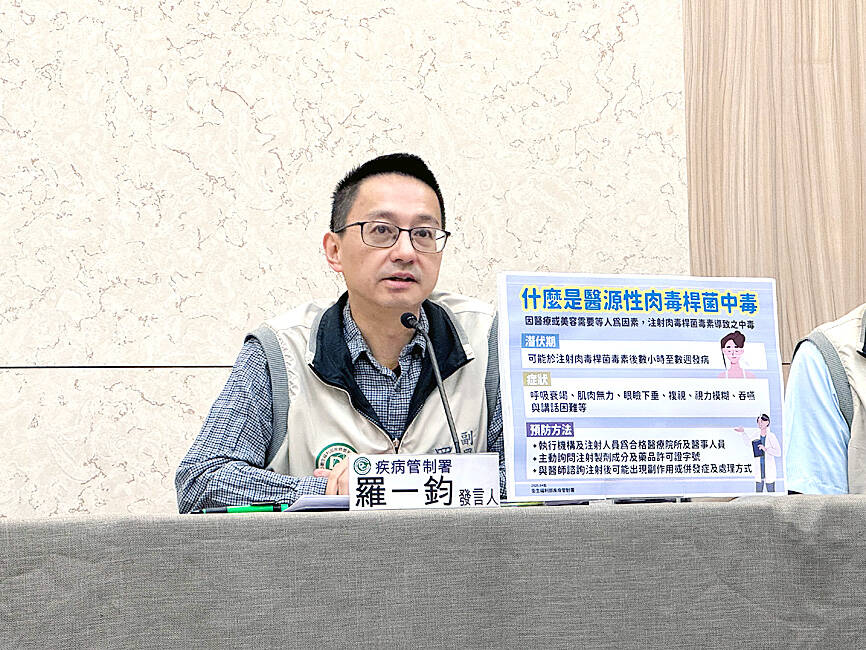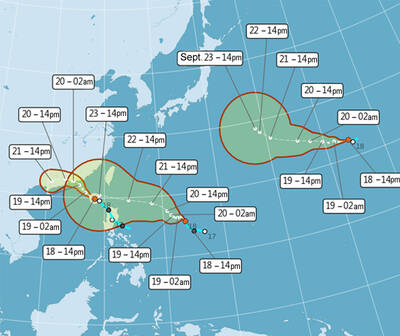A woman in her 40s was hospitalized with severe botulism after receiving injections that she purchased online, the Centers for Disease Control (CDC) said yesterday.
CDC physician Lin Yung-ching (林詠青) said the seller allegedly traveled to the woman’s home late last month to administer injections in her forehead and cheeks for cosmetic purposes.
Three days after the injections, the woman developed symptoms including difficulty swallowing, disrupted salivary secretion, drooping eyelids, muscle weakness and general fatigue, Lin said, adding that she sought medical treatment the next day and was hospitalized.

Photo: CNA
On the sixth day after the onset of symptoms, the woman was transferred to an intensive care unit and put on a ventilator as she had difficulty breathing, he said.
Blood serum and stool tests were negative for botulinum toxin, but that might have been because the specimens were collected more than a week after the woman received the injections, he said.
However, that her symptoms matched those of botulism and the injections before their onset justify the diagnosis, Lin added.
The woman’s condition had improved and she had been transferred to a normal ward, he said.
The local health department is investigating the seller and the source of the products, as well as whether they were illegally sold and how the injections were administered, the CDC said.
CDC Deputy Director-General Philip Lo (羅一鈞) said that such injections for cosmetic and medical purposes contain low doses of botulinum toxin, so the risk of botulism is minimal.
However, the risk is greater if the source of the product is unknown, Lo added.
Since 2019, there have been eight reported cases of botulism associated with aesthetic medicine in Taiwan, but the latest case is the only one of severe botulism, he said, adding that the woman’s condition improved after she was treated with a botulism antitoxin, a product that costs NT$226,480 per vial and must be purchased privately.
People seeking Botox treatments should research the procedure, only get injections at registered healthcare facilities and have them administered by registered healthcare practitioners, make sure the physician informs them about possible side effects and complications, as well as response measures, and check the drug permit license on product, the CDC said.
Meanwhile, CDC Epidemic Intelligence Center Director Guo Hung-wei (郭宏偉) said that four new cases of measles — two local and two imported — were reported last week.
The local cases are two boys under one year old who both had links to a previously reported imported case from Vietnam, while the two imported cases are a one-year-old boy and a woman in her 30s who visited Vietnam during their incubation periods, Guo said.
The two local cases had visited the same clinic as a previously confirmed case and they developed symptoms 10 and 11 days after their visits, Lin said.
The incubation period of measles can be as long as 18 days, so people who are identified as close contacts of confirmed cases should avoid public venues or wear a mask, and if they develop suspected symptoms, they should avoid seeking medical attention on their own and contact the local health department to arrange treatment, the CDC said.
People should not take young children who are not fully vaccinated against measles to Vietnam at this time, while others who are visiting Vietnam should take precautionary measures to prevent infection, it said.

The Coast Guard Administration (CGA) yesterday said it had deployed patrol vessels to expel a China Coast Guard ship and a Chinese fishing boat near Pratas Island (Dongsha Island, 東沙群島) in the South China Sea. The China Coast Guard vessel was 28 nautical miles (52km) northeast of Pratas at 6:15am on Thursday, approaching the island’s restricted waters, which extend 24 nautical miles from its shoreline, the CGA’s Dongsha-Nansha Branch said in a statement. The Tainan, a 2,000-tonne cutter, was deployed by the CGA to shadow the Chinese ship, which left the area at 2:39pm on Friday, the statement said. At 6:31pm on Friday,

The Chinese People’s Liberation Army Navy’s (PLAN) third aircraft carrier, the Fujian, would pose a steep challenge to Taiwan’s ability to defend itself against a full-scale invasion, a defense expert said yesterday. Institute of National Defense and Security Research analyst Chieh Chung (揭仲) made the comment hours after the PLAN confirmed the carrier recently passed through the Taiwan Strait to conduct “scientific research tests and training missions” in the South China Sea. China has two carriers in operation — the Liaoning and the Shandong — with the Fujian undergoing sea trials. Although the PLAN needs time to train the Fujian’s air wing and

The American Institute in Taiwan (AIT) put Taiwan in danger, Ma Ying-jeou Foundation director Hsiao Hsu-tsen (蕭旭岑) said yesterday, hours after the de facto US embassy said that Beijing had misinterpreted World War II-era documents to isolate Taiwan. The AIT’s comments harmed the Republic of China’s (ROC) national interests and contradicted a part of the “six assurances” stipulating that the US would not change its official position on Taiwan’s sovereignty, Hsiao said. The “six assurances,” which were given by then-US president Ronald Reagan to Taiwan in 1982, say that Washington would not set a date for ending arm sales to Taiwan, consult

PEAK MONTHS: Data showed that on average 25 to 27 typhoons formed in the Pacific and South China seas annually, with about four forming per month in July and October One of three tropical depressions in the Pacific strengthened into a typhoon yesterday afternoon, while two others are expected to become typhoons by today, Central Weather Administration (CWA) forecaster Lee Ming-hsiang (李名翔) said yesterday. The outer circulation of Tropical Depression No. 20, now Typhoon Mitag, has brought light rain to Hualien, Taitung and areas in the south, Lee said, adding that as of 2pm yesterday, Mitag was moving west-northwest at 16kph, but is not expected to directly affect Taiwan. It was possible that Tropical Depression No. 21 would become a typhoon as soon as last night, he said. It was moving in a